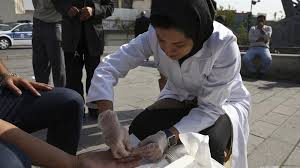Source: aljazeera.com
Protests have rocked a small town in southwestern Iran following rumours that people had been infected with HIV during a diabetes screening programme.
Demonstrators have unleashed their fury at government offices – including local health centres – in Lordegan, in Chaharmahal and Bakhtiari province, since Saturday, accusing authorities of infecting as many as 300 people with the deadly virus.
Iran’s health ministry said the total number of HIV-positive people in Chenar Mahmoudi, a small village near Lordegan, was about 70 and many were infected years ago.
Health Minister Saeed Namaki dismissed reports that the alleged outbreak was caused by a contaminated syringe used by a local nurse.
“There is no link between the HIV cases and our diabetes screening programme. The HIV cases are the result of intravenous drug use and unprotected sex,” Namaki said, adding the ministry is committed to conducting tests and treating those infected free of cost.
‘Statistically unthinkable’
A senior official at the health ministry said the diabetes screening programme was conducted during the summer and the nurse administered the blood tests using disposable kits, which are completely safe.
“The rumour spread due to lack of awareness among people in the village regarding HIV and the ways of its transmission,” he said on condition of anonymity because of restrictions on speaking to the media.
“It is medically and statistically unthinkable that a single contaminated syringe will infect 300 people,” he added.
Deputy Health Minister Alireza Raeisi told state-run news agency IRNA the ministry had conducted HIV tests on 1,400 people in Chenar Mahmoudi and found 70 positive cases, many of them infected years ago.
However, villagers accused the health authorities of using contaminated needles for blood tests.
“The health ministry came to our village for free blood sugar and insulin tests,” a resident of Chenar Mahmoud was quoted as saying by Iran Human Rights Monitor, adding the syringes were infected with an “unknown virus”.
Video has circulated online showing people protesting and clashing with local police. Iranian legislators have demanded a report on the clashes.
“The situation has been brought under control by the police, but the anger is simmering inside,” Abdullah Haidari, a journalist from Lordegan, told Anadolu Agency.
“It may be true that the infections were prior to the diabetes-screening programme, but it is the job of health officials to conduct awareness programme about HIV and its prevention,” Haidari added.
According to a 2018 report by UNAIDS, a total of 61,000 people are living with HIV in Iran with 4,400 new infections and 2,600 deaths from an AIDS-related illness that year.
